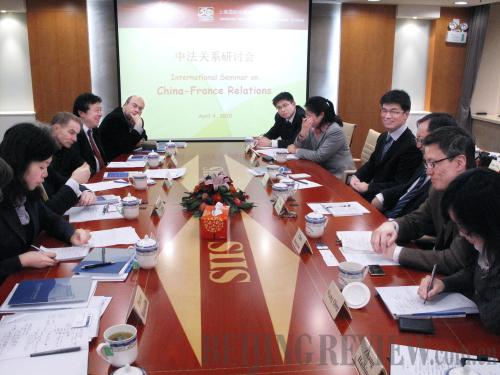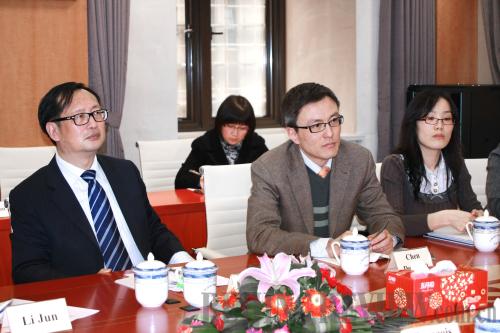|
 |
|
ACADEMIC EXCHANGES: Researchers at the Shanghai Institutes for International Studies (SIIS) hold the International Seminar on China-France Relations with their counterparts from the French Institute for Strategic Analysis at the SIIS on April 4, 2010 (COURTESY OF SIIS) |
Once a small, secretive institute with the sole target of providing information services for the government, the Shanghai Institutes for International Studies (SIIS) has grown into a full-fledged academic body and one of the leading think tanks in China, and even the world, over the past five decades. Shortly before the SIIS' 50th anniversary commemorative conference on July 24, SIIS President Yang Jiemian sat down with Beijing Review reporter Yan Wei to explain how the SIIS has strived to be successful academically while also serving the country's economic development and foreign affairs needs. Edited excerpts follow:
Beijing Review: Can you elaborate on the background when the SIIS was established?
Yang Jiemian: The SIIS was founded in 1960. Actually, preparations for its establishment started as early as 1955. That was really a hard time for the young republic. After the People's Republic of China was founded in 1949, the international situation China was facing and had to handle was extremely complicated. It was under those circumstances that a number of research institutes were founded and courses of world politics and foreign affairs were opened in some universities. This first batch of institutes devoted to international studies also included the Beijing-based China Institute of International Studies, which was founded in 1956.
Talking about the background under which the SIIS was founded, I believe there were three main factors. The first one is that the foreign climate was extremely harsh for China, and this came to a climax with the ending of the friendship between China and the Soviet Union. That was the reason why studies of world politics and international relations were badly needed. The second one is that New China desperately needed a legion of experts devoted to research and education in this regard. It was in the early 1960s that Peking University, Renmin University of China and Shanghai-based Fudan University opened their departments of world politics. The third factor is that China needed to establish foreign policy theories of its own.
Who were the first generation of the SIIS' research fellows and what was the SIIS' prime task in its early days?
 |
|
SHARING INSIGHT: SIIS President Yang Jiemian (left) and Vice President Chen Dongxiao attend the International Seminar on China-France Relations on April 4, 2010 (COURTESY OF SIIS) | The first generation of the SIIS' research fellows fell into three groups. The first group included senior scholars and diplomats who had worked with Premier Zhou Enlai since the wartime period. Jin Zhonghua, our first president, was among these people. The second group consisted of intellectuals who were accomplished professors in politics and law studies before 1949, when the Kuomintang ruled the country. The third group were young men and women who came to join the SIIS from other academic institutes such as the Shanghai Academy of Social Sciences, the East China University of Political Science and Law and the Shanghai University of Finance and Economics.
As for our goals in those years, I think collecting useful information and providing analysis in foreign affairs for both the Central Government and the Shanghai Municipal Government were the SIIS' leading task. The SIIS was engaged in some non-governmental foreign affairs as well. For example, President Jing Zhonghua often toured foreign countries to conduct academic exchanges. The SIIS also sent experts to deliver speeches for government departments and non-governmental institutions about international affairs.
After 1964, we were seriously affected by various political movements. And the heaviest blow was the catastrophic "cultural revolution" (1966-76), because of which the SIIS ceased to work and was nearly non-existent.
The SIIS has made great strides since reform and opening up began in 1978. How would you sum up the SIIS' experience?
The SIIS has developed in tandem with the nation. In other words, it made progress when the country forged ahead; it encountered difficulties when the country suffered. The SIIS was disbanded when the "cultural revolution" broke out. Beginning in 1970, however, it was partially resumed work because of major diplomatic events such as U.S. President Richard Nixon's visit to China and the normalization of diplomatic relations between China and Japan. The SIIS returned to normal and became active with the advent of reform and opening up in 1978.
In the past decades, the SIIS has changed from a secretive, government-controlled research agency to an open, academic institute. Instead of doing closed-door research, we now feature frequent exchanges with counterparts at home and abroad. In this sense, reform and opening up have given the SIIS a new life.
Moreover, the reform and opening-up policy has helped enhance the SIIS' role. As China opens itself to the outside world, the Central Government needs international studies scholars' suggestions on foreign and security strategies. The Shanghai Municipal Government also consults expert advice on the municipality's reform, opening up and development.
Reform and opening up have also created an expanding pool of talent for the SIIS. We recruited a number of researchers from higher education institutions and government agencies, as well as the military. We have also sent researchers to study abroad or take up short-term posts in government agencies. These new initiatives have given rise to the latest round of "brain gain," since the SIIS was established 50 years ago.
What are the SIIS' major academic achievements?
Our achievements mainly lie in five areas:
—Basic theoretical research. We have made contributions to studies on world politics and theories on Chinese diplomacy, as well as international economic, political and cultural studies.
| 